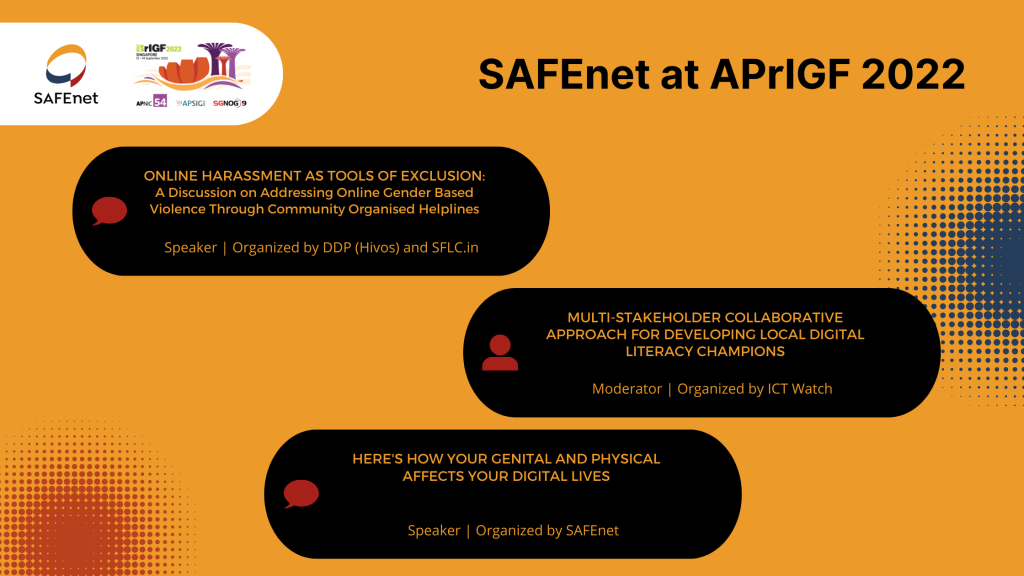The Asia Pacific Regional Internet Governance Forum (APrIGF; https://ap.rigf.asia/) 2022 is held from 12-14 September in Singapore with a hybrid format. It discussed the overarching theme of “People at the Centre: Envisioning a community-led Internet that is inclusive, sustainable and trusted” with the main thematic tracks of “Inclusion”, “Sustainability”, and “Trust”. The use of high-level thematic tracks was to enable discussions on cross-cutting issues related to Internet Governance in the Asia Pacific region.
SAFEnet participation was through Ellen Kusuma as Head of Digital At-Risks (DARK) subdivision, who joined the joint fellowship of APSIG (Asia Pacific School of Internet Governance), which was held earlier from 8-11 September 2022, and APrIGF 2022 itself.
Eleven subjects were delivered by resourceful speakers and discussed during the APSIG 2022 sessions: Internet Governance ecosystem; Internet Technologies and Security Standards; How the Internet Works – IP Go game; Accessibility, Diversity and the Digital Divide; Digital Economy and Future of Work; Cybersecurity and Implications of Cross-border Cybercrimes / Cyber laws; Cyber Security Policy – Roleplay; Diversity and Internet Governance; Privacy and Digital Rights; DNS and Human Rights; and Towards a multilingual Internet: IDNs, Universal acceptance, Content. With the engaging curriculum, it certainly contributed in broadening the perspective of SAFEnet\’s advocacy, especially on online gender based violence context, which was pioneered by the DARK subdivision.
For the APrIGF 2022, Ellen Kusuma also involved in several sessions during the three days event. She was speaking at a session hosted by DDP/Hivos and SFLC.in from India on the topic of “Online harassment as tools of exclusion: A discussion on Addressing Online Gender Based Violence Through Community Organised Helplines” on the first day of the event. She shared about SAFEnet\’s effort in tackling online gender based violence in Indonesia through the initiative called Awas KBGO (Beware of Online Gender Based Violence) which provides non-discriminatory helpline that also practices data minimalization to mitigate security risks. In this session there were Nurul Nur Azizah from Konde.co who shared the perspective from media and journalist in Indonesia, then Radhika Jhalani (SFLC.in) and Bishakha Datta (Point of View) who also shared their advocacy contexts in India.
Watch the session:
Later on, through a showcase session \”Here\’s How Your Genital and Physical Affects Your Digital Lives\” hosted by SAFEnet on day three, she reiterated in even more details about the work Awas KBGO has done and will continue doing in the future.
The Awas KBGO advocacy started as a 16 days of activism social media campaign but then pioneered a multistakeholder effort by collaborating and working together with other stakeholders, namely the victims, service providers, government (relevant ministries and NHRIs), digital platform, law enforcements, relevant UN bodies, and others. The initiative also documented the knowledge and published guidebooks and researches on it, while at the same time pushing through the dissemination towards larger public.
Awas KBGO also diversified the format and channels (from booklet to social media posts, podcasts, YouTube videos) and improved the accessibility so the transfer knowledge could reach more vulnerable and marginalized group, such as deaf and blind communities. Remediation of the published materials included encouraging the deaf communities to develop sign language instructions around the topic of online gender based violence, and raising their awareness and capabilities to handle the subject. Other efforts currently happening is translating the resources into English language to broaden the scope of advocacy.
Watch the Showcase:
Through the brief discussion in the showcase, there was a need to share common resources and different contexts of challenges and best practices of advocating online gender based violence, especially in the Asia Pacific region as it has similarities in socio-cultural background. She also emphasized on the importance of multistakeholder approach in strategizing the advocacy of online gender based violence, much like the internet governance itself.
In a hindsight, she pushed a question to be discussed further on the multistakeholder approach model itself: how to address the power imbalance between the internet governance stakeholders in order to create a safe space in the internet for all?

